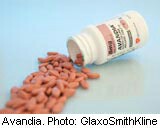
TUESDAY, June 29 (HealthDay News) — In direct contrast to research reported on Monday, a new study concludes there is no increased risk of heart attack, stroke or death by taking the diabetes drug Avandia.
This latest finding even suggests that rosiglitazone (Avandia) might be associated with a slightly lower risk of heart attack, stroke or death in certain settings, compared to people not taking either Avandia or pioglitazone (Actos), the other drug in a class of diabetes medications known as thiazolidinediones (TZDs).
“Our observational study does not suggest a significant cardiovascular hazard and may suggest a beneficial effect on ischemic cardiovascular events associated with treatment with rosiglitazone among patients with type 2 diabetes and established coronary artery disease,” said Dr. Richard Bach, an associate professor of medicine at Washington University School of Medicine in St. Louis.
Bach presented the findings at a news conference late Monday afternoon, during the American Diabetes Association (ADA) annual meeting in Orlando, Fla.
But on Monday morning, two other major studies came out with findings showing that Avandia increased the risk of cardiovascular trouble when compared to both a placebo and to Actos. Those studies appeared in the Journal of the American Medical Association and the Archives of Internal Medicine.
All of these findings will no doubt be hotly debated at a July meeting of U.S. Food and Drug Administration advisory panels that will recommend whether Avandia — which has already weathered years of controversy — should stay on the market.
In 2007, the FDA slapped a warning on Avandia’s label after a meta-analysis showed that users faced an increased risk of heart attack and death from cardiovascular problems.
Although this latest study is much smaller than those presented Monday morning, the findings are not to be dismissed, said Dr. Kirk Garratt, clinical director of interventional cardiovascular research at Lenox Hill Hospital in New York City.
“The FDA will look at this and when they put this together [with the other studies] they will come up with a warning — be thoughtful about how to prescribe this — but they will not take it off the market,” Garratt predicted.
The study released Monday afternoon was from the Rosiglitazone and Bypass Angioplasty Revascularization Investigation in Type 2 Diabetes (BARI 2D) trial, originally designed not to look at the drug’s safety but to determine how best to treat patients with both type 2 diabetes and coronary artery disease, a population at much higher risk of having a heart attack or stroke.
The study was funded by the U.S. National Institutes of Health as well as GlaxoSmithKline, which makes Avandia.
Almost 2,400 patients were randomly chosen to receive either medications plus angioplasty or bypass surgery, or medication alone.
Participants were also assigned to receive a drug to enhance insulin levels (including insulin itself) or drugs to help the body respond more effectively to insulin (either Avandia or metformin). The researchers noted that Avandia was not randomly prescribed but left to the discretion of individual physicians. That could detract from the validity of the findings, since randomized trials are considered the “gold standard” of research.
The researchers looked at 4.5 years of follow-up data. After adjusting for various factors, “the occurrence of death, heart attack and stroke was 28 percent less frequent” for those taking Avandia as compared with those patients not taking a TZD, said Bach.
The incidence of congestive heart failure was higher but this was not considered significant; there was a 45 percent increased risk of fractures, which was considered significant.
However, in one of the two studies published Monday — a large review of data led by Dr. Steven Nissen of the Cleveland Clinic — Avandia raised users’ risk of heart attack by 28 percent to 39 percent.
So, how are doctors and patients to interpret such widely divergent views on the safety of Avandia?
One possibility is that “age is playing a role in a manner we don’t even understand,” Garratt said. The ages of the participants in the BARI 2D study were skewed downwards compared to the other research, where volunteers were older and therefore more likely to be more frail.
Avandia, along with its pharmacological cousin Actos, are different from many other diabetes drugs in that they act directly on gene expression.
“Because genes change over time, perhaps this type of drug is going to have different outcomes in different age groups,” Garratt suggested.
“What we can conclude now looking at the question from multiple different angles is that we have failed to come up with a consistent message,” Garratt added. “My guess is that the marketplace will see some additional fall-off in the use of Avandia, but we know that some has already taken place. Those of us who are prescribing the medication from a cardiovascular practice perspective are already cautious. As this gets more press, that degree of caution will filter down to the internist, the family medicine physician and the diabetes expert.”
More information
The U.S. National Library of Medicine has more on thiazolidinediones.

